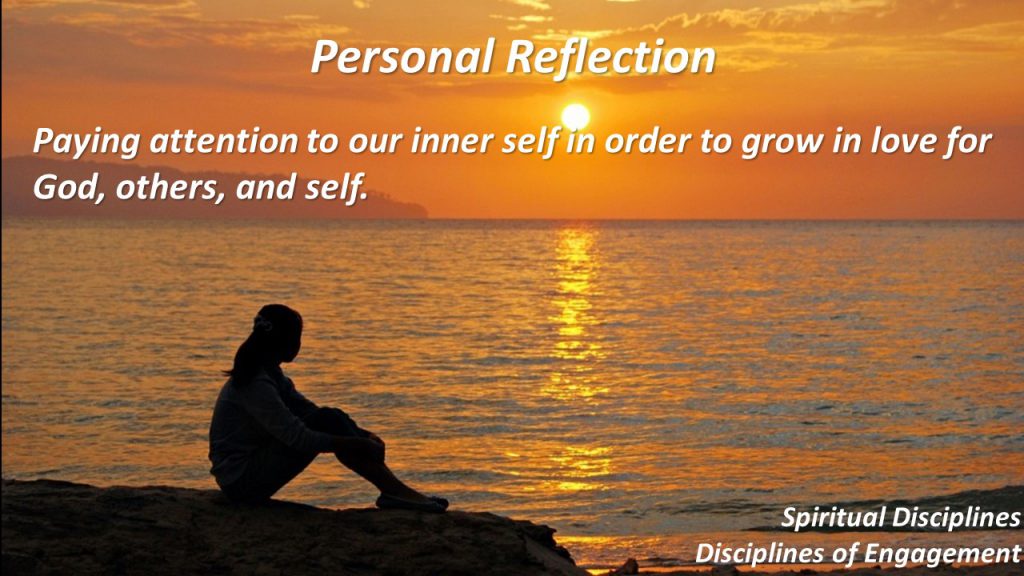

Personal reflection how to#
Scolaro added that taking moments to self-reflect can help you understand where you are in reference to where you want to be in your career, as well as how to get there. “Being serious about building a career and meeting your goals involves at least some self-reflection.” “Without self-reflection, we are just guessing and taking shots in the dark, hoping that things will miraculously work out,” says Maili Tirel, MA, an internet counselor and school psychologist based in Tartu, Estonia. If the ability to self-reflect contributes to higher emotional intelligence, it stands to reason that it might boost your career performance in turn. Why does that matter? Because research has found that emotional intelligence is a strong predictor of career success-in some cases, stronger than raw intelligence or hard skills. “In a business setting, self-reflection is really more of an emotional intelligence tool to understand how you’re showing up for other people and how you can communicate with others to have them show up for you,” Miller says. “If I’m having a rough day-if I’m depressed, sad, lonely-I am able to self-reflect, do a scan of what’s going on, see what I need and take myself in a positive direction.” Self-reflection for career successĪlthough the potential for increased well-being is likely attractive to many who feel that stress and distress have negative impacts on their health, there’s another big draw of self-reflection for the career-minded among us. “Prioritizing the positive in an action-oriented way by placing yourself in positive opportunities outweighs the negativity bias,” she says. Miller, founder of resilience and positive psychology firm A Brighter Purpose in Fairfax County, Virginia, says it’s all about prioritizing positive emotions. This is an association that makes sense to Kelly Miller, CAPP, ACC, CRT. These studies are just the tip of the iceberg of research showing positive links between reflection, health and well-being. The study, published in JAMA Internal Medicine, found that people enrolled in meditation programs saw moderate beneficial effects on anxiety and depression.Ī separate 2014 study published in Sleep looked at 54 adults who had chronic insomnia and found that meditation and mindfulness appeared to be “… a viable treatment option for adults with chronic insomnia and could provide an alternative to traditional treatments for insomnia.”

Meanwhile, a 2014 review of 47 past studies found that meditation’s stress-reducing effects aren’t just our collective imagination. Slowly but surely, peer-reviewed research has caught up with these theories about self-reflection.įor example, a 2011 study published in The Journal of Psychology found that college students who were more self-reflective were more likely to report higher levels of satisfaction with life and related measures of mental well-being. Mental health practitioners have long regarded practices associated with self-reflection as beneficial to mental well-being and health in general. “Whether you are interested in furthering your career, strengthening your relationship or repairing old friendships, self-reflection will allow you to understand if your participation in this area of life is actually leading to the result you are looking for,” Scolaro says. It’s the starting point for positive change, says Brie Scolaro, LMSW, co-director of Aspire Psychotherapy in New York City. Simply understanding, however, isn’t the end goal of self-reflection. But the core action that defines self-reflection is looking inward for understanding. It can take many forms-yoga, meditation, nature walks and controlled breathing are all associated practices. It’s a tool that helps you gain perspective on your strengths, behaviors, thoughts and desires. It’s the act of looking inward with the goal of understanding who you are, how you feel and where you want to be. Read on to learn the science behind self-reflection and how you can harness it to improve your life in 2022 and beyond.

But since that time, research has put self-reflection on the menu for those who are hungry for science-backed ways to improve their lives. And if you’re able to self-reflect, you’re already on the right path to potential improvements in well-being, health and even career success.Ī couple decades ago, a statement like that might have read as the gimmicky promotion of unproven theories or pseudoscience. But what’s happening inside your mind when you’re doing these activities?Īs it turns out, you may be engaging in self-reflection. When you’re doing yoga, taking a walk in nature, meditating or doing controlled breathing, what are you really doing? Perhaps you’re getting some exercise or just answering the call of the daily routine.


 0 kommentar(er)
0 kommentar(er)
